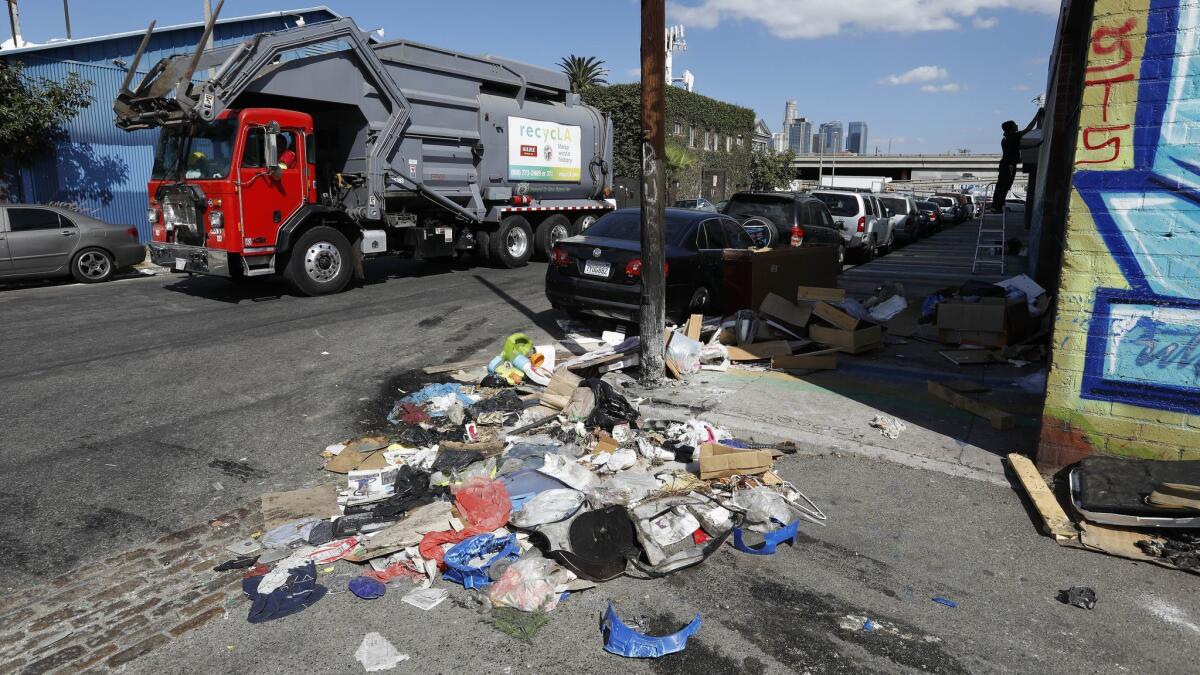Editorial: A job picking up trash won’t pull a homeless person off the street. But it’s not a bad start

- Share via
A pilot program employing homeless people to pick litter off streets and pull weeds won’t solve homelessness by any stretch of the imagination. But it’s not a bad way to help a small portion of the city’s vast homeless population work its way out of homelessness.
Los Angeles City Councilmen Joe Buscaino and Bob Blumenfield proposed the pilot more than a year ago. Now, after winding its way through the City Council bureaucracy, the program is just one committee away from going to the full council for a vote.
It’s not a make-work program — the city needs help collecting litter. The city’s Bureau of Sanitation prioritizes collecting bulky items (that sofa on the sidewalk, for example), removing illegally dumped trash and deep cleaning around homeless encampments. Even though the bureau has put a couple thousand new curbside trash cans around the city in the last few years, there’s still plenty of litter and not enough workers to collect it all.
The pilot is designed to help homeless people who have trouble latching on to even the lowest rungs of the economic ladder.
So this new program would address both a city need and a human need. The new workers would be paid not out of the Bureau of Sanitation budget, but with city funds set aside for homelessness programs, to the tune of about $2.9 million a year. Chrysalis, a respected social services provider, would run the pilot, selecting the homeless individuals for the program. At any one time, about 30 workers who are homeless would be divided among six crews, each with a supervisor from Chrysalis. The crews would be dispatched across the city by bureau workers.
This isn’t about exploiting cheap labor or desperate Angelenos. Chrysalis wouldn’t comb the streets for homeless people looking for odd jobs and then dump them back where they came from at the end of the day. Nor is it a quick, imperfect fix for people who’d just been laid off and needed any kind of job to tide themselves over until they could resume their careers.
The pilot is designed to help homeless people who have trouble latching on to even the lowest rungs of the economic ladder. Participants would be chosen from among those who had been disconnected from the workforce for years, who need to learn how to have a job — how to show up on time, dress appropriately, deal with a boss, interact with the public.
The trash pick-up pilot is part of Chrysalis’ overall program, the goal of which is to launch a variety of people living on the margins (not all of them homeless) into stable, long-term employment. Any homeless person selected for the city pilot program will have gone through about 25 hours of training and counseling at Chrysalis.
Enter the Fray: First takes on the news of the minute from L.A. Times Opinion »
Each person in the pilot would work about 32 hours a week and, ideally, transition out of the program after several months into longer-term jobs that Chrysalis case managers help them find. Some workers may go on into the city’s Targeted Local Hire program, which tries to place residents from underserved groups (formerly incarcerated individuals, foster youth, veterans) into city jobs. Unfortunately, even with the unemployment rate nationally at rock bottom, the pool of people in that program outstrips the number of available jobs.
This pilot program would pay workers about $13 an hour — not enough for them to afford to rent an apartment — and comes with no guarantee of housing. As a result, some of these workers may spend their nights on the streets. Others may live in shelters. Chrysalis would link people to housing services and try to help people get emergency housing or motel vouchers. But the main focus would be employment.
The pilot should obviously not be seen as a substitute for the housing and services that homeless people desperately need — and that the city and county need to provide at a faster pace. Nor should giving homeless people jobs picking up trash be seen as their way of doing penance for being allowed to put a tent on the sidewalk (although some city residents will see it that way). Instead, the proposed pilot would be a modest but enterprising program that offered some hard-earned money, basic job skills and a glimmer of a pathway back into the mainstream workforce. The council should give it the green light, track its results and, if it proves effective, extend its life.
Follow the Opinion section on Twitter @latimesopinion or Facebook
More to Read
A cure for the common opinion
Get thought-provoking perspectives with our weekly newsletter.
You may occasionally receive promotional content from the Los Angeles Times.









